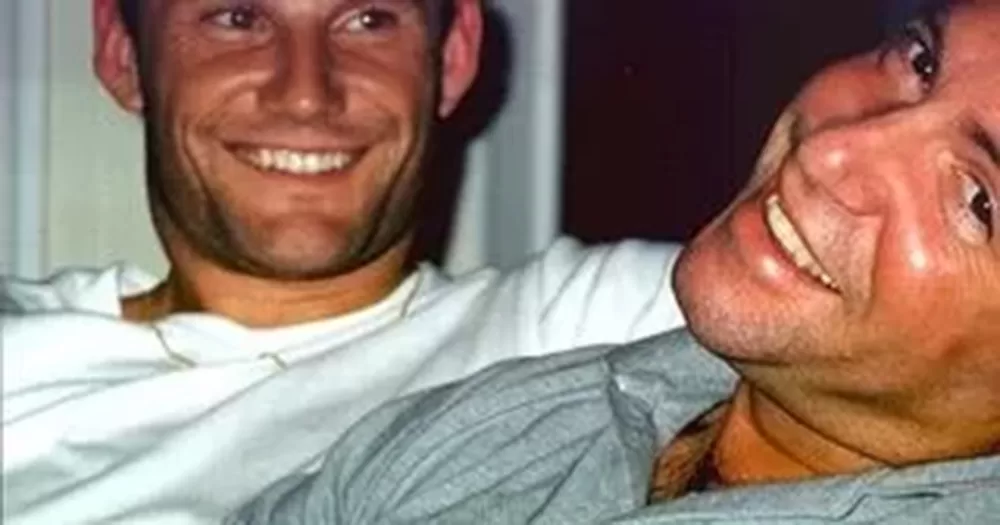For the first 28 years of his life, Andy Cramer hid his sexuality, so it was a surprise he would go on to become one of the pioneers in creating a space for gay online dating.
Born in upstate New York in the 1950s, Andy Cramer grew up in a time when societal norms forced many LGBTQ+ individuals to hide their true selves.
“When I was a kid, I looked up what a homosexual was in my World Book Encyclopaedia and when I found out that it was outlawed in most of the United States and was considered to be a psychological disability, I closed the book and went into the closet,” said Andy.
After graduating from the prestigious Wharton School of the University of Pennsylvania in 1970, Andy embarked on a journey westward, at first settling in Albuquerque, New Mexico. It was there that he opened his first retail store, but after four years in Albuquerque, Andy made his way to San Francisco, a city that would become synonymous with LGBTQ+ activism and progress.
In 1977, Andy opened more stores – in the locations of Polk Street and the Castro District, and so began what would prove to be a lifetime of connecting LGBTQ+ people.
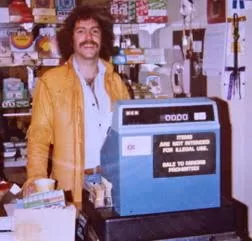
“By the time I was 28, I had decided that there was nothing wrong with me and I started opening retail stores. They were outrageous. They were bait. They were fun. In a city that stayed open till six o’clock at night, I opened my stores until 11 o’clock at night. I had a DJ playing dance music, with all kinds of merchandise in the store, from clothing, to household furnishings, to jewellery and to leather … San Francisco was the epicentre of the gay world.”
The onset of the HIV/AIDS epidemic in 1981 brought a shrouded crisis to the city. Andy’s stores, already deeply embedded in the community, transformed into refuges providing essential services to those affected. Collaborating with numerous HIV/AIDS organisations, Andy and his team became frontline workers and played a pivotal role in caring for thousands of people.
During that period, half of Andy’s staff had AIDS or HIV, and they could only work two hours per day because of the side effects of the medications they were taking.
Andy tackled the unprecedented challenges by campaigning for action and spotlighting the LGBTQ+ community.
“We did all kinds of things during that time. We started the Gay Games with my friend, Tom Waddell. I made t-shirts and hats, we went to a rodeo to raise funds and fundraisers. We put the ‘Stop AIDS’ campaign online. Then I went home every night to visit my dying friends until there was a [drug] cocktail.”
The emotional trauma and loss from the HIV/AIDS epidemic had a long-lasting impact, and Andy recognised the need for greater connectivity within the gay community.
In the pre-internet era, he launched Gay.Net in 1993, the first LGBTQ+ bulletin board accessible via dial-up modems. The platform quickly grew to 10,000 monthly subscribers within the first year, providing a vital space for gay men to connect and share information.
Bulletin board systems served as online spaces, which were local or regional dial-up networks typically run on a single computer or a small cluster operated mainly by hobbyists or enthusiasts.
“We went out and bought a little machine, put up the content and mailed it to the people who then put it on their machines locally,” said Andy.
“I recognised that while we were helping people during the AIDS epidemic, there were also a lot of people like me who were lonely and isolated. There were times when I felt like I was the only gay person in the world because I didn’t have any other frame of reference,” he added.
Since Andy came from a business background, he soon felt challenged by some of the gay online dating site’s technical issues. Al Farmer, a technologist who was working for IBM at the time, became a subscriber and realised he could come on board to help with the site. After a few years of working together, Al and Andy ended up falling in love. They’ve now been married for the last 27 years.
“He would get on every day and help me figure out how to give people what they needed – to be able to meet each other, upload pictures, have a hookup, find a relationship or to make a friend. When we got married in 1998, some of the people from Gay.Net actually came to it,” said Andy.
Andy’s goal for Gay.Net was to be a gateway for the gay online world – offering chat rooms, community activities and a library of information on gay interests, politics and health.
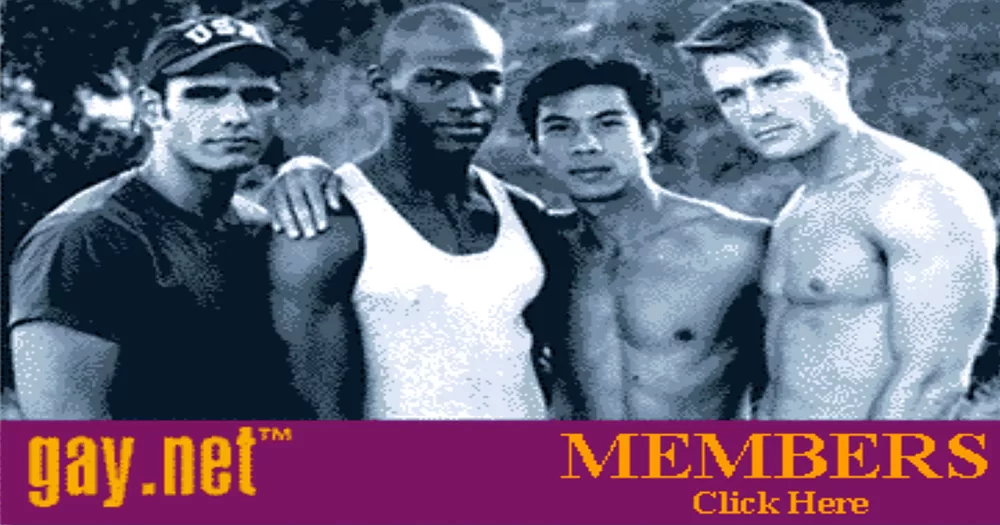
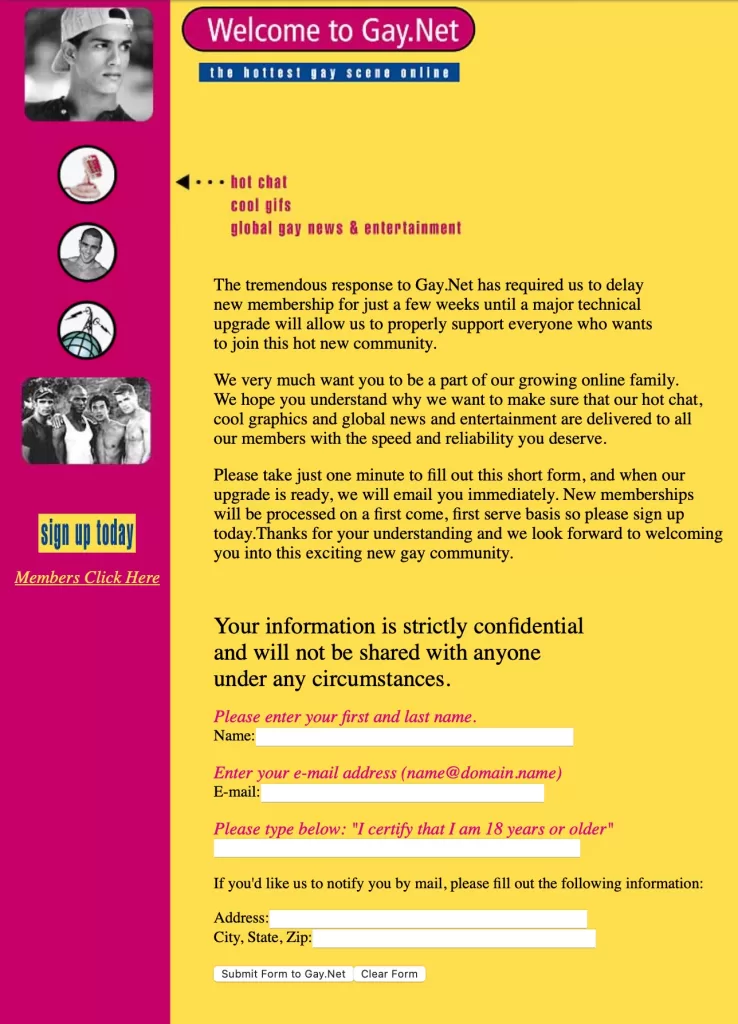
The service also functioned as a gay online dating service, connecting gay men with shared interests and providing them the chance to build a relationship before deciding to meet offline – the early beginnings of what would lead to modern LGBTQ+ dating apps, such as Grindr.
Andy’s vision reached new heights when Gay.com and Gay.Net merged. He said, “I traded my stock, merged the companies and became the CEO. Then I paid $2,000 a month to Yahoo for the keyword ‘gay’ and built it to [being used by] four million people.”
“CompuServe, Prodigy and AOL censored everything. I made it safe for gay people to come together and be their genuine selves online,” said Andy.
In 1999, Andy was pressured to take the company public – a decision he felt would lead to whitewashing and damage the heart of the gay online dating space.
Ultimately, he decided to step down as CEO, sell his stock for millions of dollars and move to the countryside with his husband. “I waited to see what was going to happen. Well, they took it public in 2004, whitewashed it and they lost the community,” said Andy.
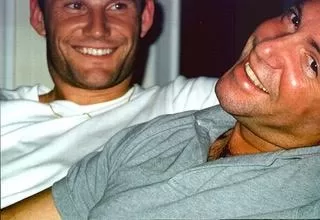
Now in his 70s, Andy is still working on building connections and community with his company, The Caregiving Network, which provides caregivers with services and support.
He highlights the importance of caring for the ageing LGBTQ+ community: “One of the biggest problems is that when LGTBQ+ people go into assisted living, they’re leaving their friends behind and some go back into the closet again. I’m working to find residential communities that welcome LGBTQ+ people – so they can continue ageing together and go into assisted living together one by one.”
© 2023 GCN (Gay Community News). All rights reserved.
Support GCN
GCN is a free, vital resource for Ireland’s LGBTQ+ community since 1988.
GCN is a trading name of National LGBT Federation CLG, a registered charity - Charity Number: 20034580.
GCN relies on the generous support of the community and allies to sustain the crucial work that we do. Producing GCN is costly, and, in an industry which has been hugely impacted by rising costs, we need your support to help sustain and grow this vital resource.
Supporting GCN for as little as €1.99 per month will help us continue our work as Ireland’s free, independent LGBTQ+ media.
